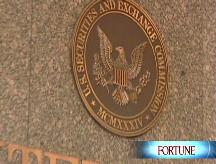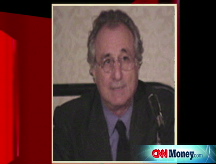SEC chief vows action on Madoff scandal
Cox says 'credible information' was brought to the watchdog over a period of 10 years, but no action was taken.
 |
| Bernard Madoff outside a courthouse in New York. |
NEW YORK (CNNMoney.com) -- The lead government regulator charged with protecting investors vowed Wednesday to get to the bottom of why allegations over a decade's time about alleged fraudster Bernard Madoff were not fully explored.
"Credible information - on multiple occasions - was brought to the agency, but at no point were referred for formal investigation," said Christopher Cox, chairman of the Securities and Exchange Commission.
The information concerned Madoff's actions over the last 10 years, during which he is accused of leading a $50 billion Ponzi scheme under the guise of an investment advisory business.
On Tuesday, the SEC said it had launched an internal investigation into how Madoff's alleged actions were able to continue unchecked for at least 10 years.
"We need answers to these questions," said Cox, who was speaking to reporters in Washington, D.C. "The reason for this review is to make sure that we uphold the traditionally very high standards of the SEC."
The investigation is expected to explore any contacts SEC staffers may have had with the Madoff family and firm and what impact, if any, those relationships may have had on staff decisions.
"There is no evidence thus far of any wrongdoing by any SEC professional," Cox said.
The alleged $50 billion Ponzi scheme operated by Madoff may have cost some of the world's largest financial firms hundreds of millions of dollars apiece. Charitable foundations and individual investors are also at risk.
But as the financial crisis unfolded, Madoff's scheme became unsustainable.
Cox did not deny that other frauds may be exposed.
"When the economic tide goes out, some of the skeletons that are washed up on the shore are Ponzi schemes such as this one," he said.
Meanwhile, the SEC's handling of the Madoff case has drawn the attention of at least one member of Congress.
Sen. Chuck Grassley, R-Iowa, a ranking member of the Senate Finance Committee, asked the SEC's inspector general to provide regular updates on the Madoff investigation.
"I am extremely interested in learning how the massive frauds being described in the press could have been perpetrated despite SEC regulatory and investigative activity regarding Mr. Madoff," Grassley said in a letter to inspector general David Kotz.
Earlier on Wednesday, a Madoff bail hearing in federal court in Manhattan was canceled after a resolution was reached on specific bail conditions, according to court documents.
Madoff's wife, a co-signer on his bond, agreed to surrender her passport - a condition sought by the government. In addition, Madoff will be subject to home detention and electronic monitoring with a 7 p.m.-to-9 a.m. curfew, according to the documents.
Court documents showed that Madoff's home detention was required because he failed to secure the required number of co-signers for his bail bond.
Madoff was released on a $10 million personal recognizance bond secured by his $7 million Manhattan apartment.
On Monday, a federal judge issued an order that may help investors swindled by the scheme recover some of their money.
The order paved the way for the Securities Investor Protection Corporation, a non-profit organization created by Congress to aid customers of fraudulent brokers, to begin liquidating the remaining assets of Madoff's firm.
"We are working very closely with SIPC to ensure that investors are insured to the maximum extent possible," Cox said.
SIPC officials said Monday that the corporation has appointed a trustee to review the firm's records and determine the value of any remaining assets.
A SIPC trustee typically reviews claims submitted by investors who are owed missing cash and securities from their accounts. Using whatever money is left in the firm's accounts, the claims are then repaid on a "pro rata" basis, which means that investors are repaid proportionally based on the size of their claims.
If the defunct fund does not have sufficient money left in its accounts, SIPC maintains a fund intended to satisfy claims of up to $500,000 on eligible securities, such as stocks and bonds.
Additionally, the trustee can help burned investors by transferring their accounts to a solvent brokerage. But SIPC's president, Stephen Harbeck, warned Monday that transferring funds may not be possible in this case.
"The state of the firm's records may preclude a transfer of customer accounts," Harbeck said in a statement. "Also, because the size of the misappropriation has not yet been established, it is impossible to determine each customer's pro rata share of 'customer property'."
Meanwhile, a group of aggrieved investors filed a class-action suit Wednesday against a high-profile investment firm that acted as a middleman between Madoff and investors.
The suit claims that New York City-based Ascot Partners failed to conduct due diligence before sinking nearly all of the firm's money into Madoff's fund.
In addition, the investors claim that Ascot, by simply turning over all of its money to a single investment manager, violated the terms of its offering memorandum. The allegations are said to amount to securities fraud, negligence and breach of fiduciary duty.
CNN Wire reports were used in preparing this article. ![]()



